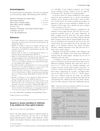 10 citations,
February 2011 in “Journal der Deutschen Dermatologischen Gesellschaft”
10 citations,
February 2011 in “Journal der Deutschen Dermatologischen Gesellschaft” The document concludes that proper diagnosis and evidence-based treatments are crucial for managing hair diseases, and psychological support for patients is important.
 6 citations,
July 2017 in “Biochemical and Biophysical Research Communications”
6 citations,
July 2017 in “Biochemical and Biophysical Research Communications” The Hairless gene is crucial for hair cell development, affecting whether skin cells become hair or skin and oil gland cells.
[object Object]  2 citations,
October 2018 in “Springer eBooks”
2 citations,
October 2018 in “Springer eBooks” Cancer treatments can cause skin-related side effects that may affect patient quality of life and require changes in treatment.
 1 citations,
March 2019 in “Lasers in Surgery and Medicine”
1 citations,
March 2019 in “Lasers in Surgery and Medicine” The conference reported improvements in muscle volume, skin cancer diagnosis, facial and vaginal rejuvenation, and hair growth using various laser treatments.
 20 citations,
November 2012 in “Journal der Deutschen Dermatologischen Gesellschaft”
20 citations,
November 2012 in “Journal der Deutschen Dermatologischen Gesellschaft” Hair diseases can have psychological effects and should be treated with a combination of psychosomatic care, therapy, and medication.
 3 citations,
October 2022 in “Frontiers in Surgery”
3 citations,
October 2022 in “Frontiers in Surgery” Proteomics combined with other technologies can lead to a better understanding of skin diseases.
 3 citations,
January 2020 in “Clinical dermatology review”
3 citations,
January 2020 in “Clinical dermatology review” Trichoscopy is useful for diagnosing hair and scalp disorders in people with darker skin.
 242 citations,
February 2016 in “Science”
242 citations,
February 2016 in “Science” Hair loss and aging are caused by the breakdown of a key protein in hair stem cells.
 7 citations,
July 2019 in “International Journal of Molecular Sciences”
7 citations,
July 2019 in “International Journal of Molecular Sciences” PGA-4HGF may help treat hair loss by activating hair growth pathways and extending the hair growth phase.
 76 citations,
January 2017 in “World Journal of Stem Cells”
76 citations,
January 2017 in “World Journal of Stem Cells” Fat tissue cells are a promising option for healing various diseases, but more research is needed to ensure they are safe and effective.
 25 citations,
March 2019 in “Dermatologic therapy”
25 citations,
March 2019 in “Dermatologic therapy” Intralesional therapy for keratoacanthoma is effective and has fewer side effects than systemic treatments.
 5 citations,
August 2003 in “British Journal of Dermatology”
5 citations,
August 2003 in “British Journal of Dermatology” Iron deficiency might contribute to hair loss in women.
 4 citations,
January 2019 in “International journal of molecular sciences”
4 citations,
January 2019 in “International journal of molecular sciences” Genetically modified sheep with more β-catenin grew more wool without changing the wool's length or thickness.
 6 citations,
October 2007 in “Medical Hypotheses”
6 citations,
October 2007 in “Medical Hypotheses” Male pattern baldness might have evolved to help protect against prostate cancer by increasing UV radiation on the scalp.
 4 citations,
July 2005 in “International Journal of Dermatology”
4 citations,
July 2005 in “International Journal of Dermatology” Topical PUVA and tacrolimus ointment can effectively and safely treat infant alopecia universalis.
 10 citations,
August 1991 in “PubMed”
10 citations,
August 1991 in “PubMed” Inflammation, possibly triggered by a specific bacteria and activated by UV radiation, may contribute to male pattern baldness.
 7 citations,
May 2010 in “British Journal of Dermatology”
7 citations,
May 2010 in “British Journal of Dermatology” Women treated with X-ray for scalp fungus as children had a higher chance of hair loss, especially with higher radiation doses and severe fungus infections.
 13 citations,
July 2004 in “Skinmed”
13 citations,
July 2004 in “Skinmed” Common types of non-scarring hair loss have various causes and treatments, but more effective solutions are needed.
 3 citations,
December 2011 in “Pediatric Dermatology”
3 citations,
December 2011 in “Pediatric Dermatology” The patient's long-term hair loss was caused by leukemia treatments and low estrogen levels, worsened by her genetic tendency for hair loss.
 70 citations,
July 2020 in “Pharmacological Reports”
70 citations,
July 2020 in “Pharmacological Reports” Cepharanthine, a Japanese hair loss drug, shows promise as a COVID-19 treatment but needs more testing.
 62 citations,
January 2003 in “Dermatology”
62 citations,
January 2003 in “Dermatology” Sunlight worsens hair loss; protect scalp.
 45 citations,
August 2019 in “Dermatologic Therapy”
45 citations,
August 2019 in “Dermatologic Therapy” Hair loss treatments work better with lifestyle changes.
36 citations,
April 2005 in “British journal of dermatology/British journal of dermatology, Supplement” Radiation therapy is an effective treatment for severe scalp cellulitis with mild side effects and no long-term complications.
 28 citations,
May 1978 in “Archives of dermatology”
28 citations,
May 1978 in “Archives of dermatology” Alopecia mucinosa on the face can be linked to mycosis fungoides, a type of lymphoma.
 27 citations,
January 2002 in “Exogenous Dermatology”
27 citations,
January 2002 in “Exogenous Dermatology” Chronic exposure to sunlight may worsen male pattern baldness and protecting the scalp from the sun could slow it down.
 19 citations,
January 2015 in “Current problems in dermatology”
19 citations,
January 2015 in “Current problems in dermatology” Ultraviolet rays damage hair, smoking may cause hair loss, and good nutrition is important for hair health, but genetics mainly decide hair thickness.
 8 citations,
January 2020 in “Skin Pharmacology and Physiology”
8 citations,
January 2020 in “Skin Pharmacology and Physiology” Caffeine improves hair growth, thickness, and reduces shedding.
8 citations,
September 2015 in “Radiotherapy and oncology” Scalp cooling does not stop hair loss from radiotherapy.

Activating certain hair follicle cells could prevent hair loss from cancer treatments.
[object Object] Boosting certain cell signals can prevent hair loss from chemotherapy and radiation.


























